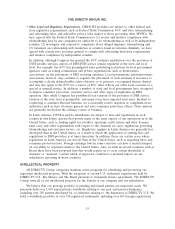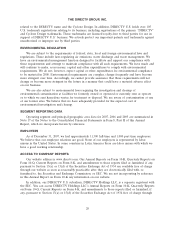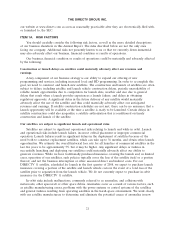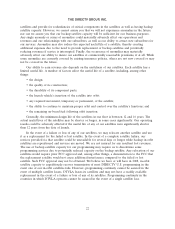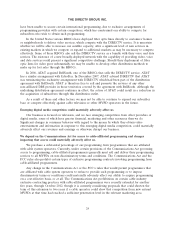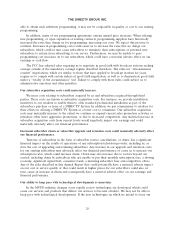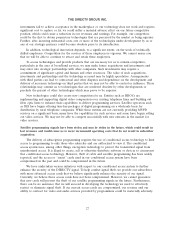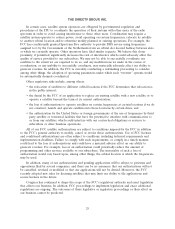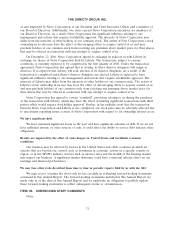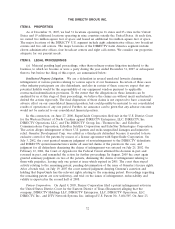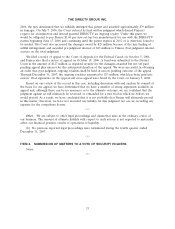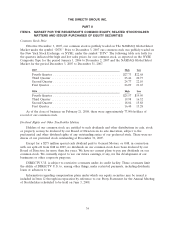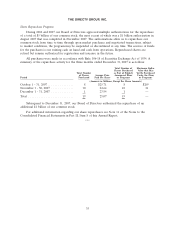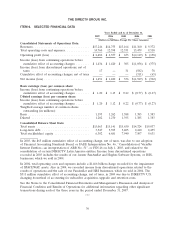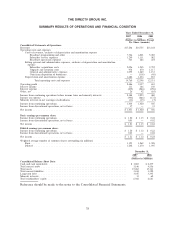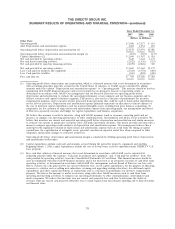DIRECTV 2007 Annual Report Download - page 38
Download and view the complete annual report
Please find page 38 of the 2007 DIRECTV annual report below. You can navigate through the pages in the report by either clicking on the pages listed below, or by using the keyword search tool below to find specific information within the annual report.THE DIRECTV GROUP, INC.
In certain cases, satellite system operators are obligated by governmental regulation and
procedures of the ITU to coordinate the operation of their systems with other users of the radio
spectrum in order to avoid causing interference to those other users. Coordination may require a
satellite system operator to reduce power, avoid operating on certain frequencies, relocate its satellite
to another orbital location and/or otherwise modify planned or existing operations. For example, the
FCC has conditionally granted Spectrum Five authority to provide DBS service using frequencies
assigned to it by the Government of the Netherlands from an orbital slot located halfway between slots
at which we currently operate. Other operators have filed similar requests. We believe this closer
proximity, if permitted, significantly increases the risk of interference which could adversely affect the
quality of service provided to our subscribers. We may not be able to successfully coordinate our
satellites to the extent we are required to do so, and any modifications we make in the course of
coordination, or any inability to successfully coordinate, may materially adversely affect our ability to
generate revenue. In addition, the FCC is currently conducting a rulemaking proceeding to consider,
among other things, the adoption of operating parameters under which such ‘‘tweener’’ systems would
be automatically deemed coordinated.
Other regulatory risks include, among others:
• the relocation of satellites to different orbital locations if the FCC determines that relocation is
in the public interest;
• the denial by the FCC of an application to replace an existing satellite with a new satellite or to
operate a satellite beyond the term of its current authorization;
• the loss of authorizations to operate satellites on certain frequencies at certain locations if we do
not construct, launch and operate satellites into those locations by certain dates; and
• the authorization by the United States or foreign governments of the use of frequencies by third
party satellite or terrestrial facilities that have the potential to interfere with communication to
or from our satellites, which could interfere with our contractual obligations or services to
subscribers or other business operations.
All of our FCC satellite authorizations are subject to conditions imposed by the FCC in addition
to the FCC’s general authority to modify, cancel or revoke those authorizations. Use of FCC licenses
and conditional authorizations are often subject to conditions, including technical requirements and
implementation deadlines. Failure to comply with such requirements, or comply in a timely manner,
could lead to the loss of authorizations and could have a material adverse effect on our ability to
generate revenue. For example, loss of an authorization could potentially reduce the amount of
programming and other services available to our subscribers. The materiality of such a loss of
authorization would vary based upon, among other things, the orbital location at which the frequencies
may be used.
In addition, many of our authorizations and pending applications will be subject to petitions and
oppositions filed by several companies, and there can be no assurance that our authorizations will not
be cancelled, revoked or modified or that our applications will not be denied. Moreover, the FCC
recently adopted new rules for licensing satellites that may limit our ability to file applications and
secure licenses in the future.
Congress has continued to shape the scope of the FCC’s regulatory authority and enact legislation
that affects our business. In addition, FCC proceedings to implement legislation and enact additional
regulations are ongoing. The outcomes of these legislative or regulatory proceedings or their effect on
our business cannot be predicted.
29


